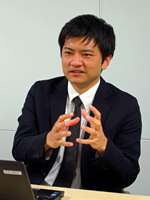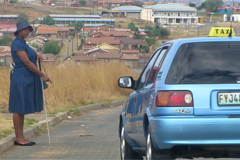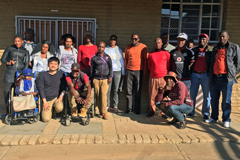InterviewJICA-RI Focus Vol. 42 - Interview with Research Fellow Kengo Igei
2018.03.16
Econometric analysis, a method used in a variety of fields of development, has not yet been widely applied in the field of disability studies. Kengo Igei is a research fellow who sees the potential of econometric analysis in disability studies. We talked with him regarding his work in this field in the Republic of South Africa.
■Profile
M.A. in Economics, Graduate School of Economics, Waseda University; M.A. in International Development Studies, National Graduate Institute for Policy Studies; Ph.D. in International Studies, Graduate School of Frontier Sciences, University of Tokyo. Assumed his current post in May 2013. Research fields include applied microeconometrics and development economics.

— How did you get involved in development economics while learning about econometric analysis?
At my first graduate school I studied econometrics and discovered its appeal, which uses data to verify social structures and human behavior. With econometric analysis we are able to visualize reality with objective data and verify various hypotheses on human and organizational behavior. In the midst of my studies, I read a Japanese book about children in Africa, “Kodomotachi no Africa,” written by Hiroyuki Ishi and published by Iwanami Shoten Publishers, and was struck by how different one's living circumstance can be, simply by being born in a different place. At my second graduate school, I studied development economics and learned about microeconometrics and the impact evaluation method. That is when I began to want to use econometric analysis to help solve problems in developing countries.
— Tell us about your research project "An empirical study on the poverty and employment of persons with disabilities in South Africa."
The first is the relationship between poverty and disability. I used the Multidimensional Poverty Index (MPI), which measures poverty not by income but by multiple factors including education, employment and living standards. I analyzed the poverty situation of persons with disabilities in the Republic of South Africa (hereinafter, South Africa) as well as differences between persons with and without disabilities. It is said that there is a bidirectional causal relationship between disability and poverty, so the aim was to measure the real impact of disability on poverty.
The data I used was a 10% sample of the 2011 population census. Even with 10%, it was a sizeable sample of around 4.3 million people, so I was able to analyze the relationship between poverty and disability with a more in-depth look into the types and severity of disabilities, which past research had not been able to do before. The analysis was academically noteworthy in this point, as well as in the analysis of the real impact of disability on poverty. The results are compiled in Working Paper No. 142, "Untangling Disability and Poverty: A Matching Approach Using Large-scale Data in South Africa," published in March 2017 (find the link below).
The second is regarding disability and employment. As with poverty, there is a bidirectional causal relationship between the two factors, so the aim was to analyze the real impact of disability on employment. I used the 2002 - 2015 data of the household survey conducted every year in South Africa. I also tried to analyze annual changes in the impact of disability on employment. This is because in 2007 South Africa ratified the UN Convention on the Rights of Persons with Disabilities, so I set the hypothesis that the employment gap between persons with and without disabilities should have been reduced after that year. Unfortunately, the results showed that this was not the case. The Working Paper on this analysis is scheduled to be issued within fiscal year 2017.
These two studies were realized because the data including disability in South Africa were open to the public. Even though they had the data, the data had not been used in any studies with appropriate methods. In this sense, I think my research has been meaningful.
— How did the JICA’s Technical Cooperation Project in South Africa connect with your research?
When I started "An empirical study on the poverty and employment of persons with disabilities in South Africa," the aim was initially to study the two themes of "disability and poverty" and "disability and employment." The third theme was found unexpectedly. When I shared the results of the study on disability and poverty with the JICA Human Development Department, some members of the "Project for the Promotion of Empowerment of Persons with Disabilities and Disability Mainstreaming," a Technical Cooperation Project starting in South Africa in May 2016, asked me to help with an impact evaluation on disability.
The purpose was to research the impact of the "Disability Equality Training" on the understanding of participants about disability. This training is primarily meant for people without disabilities and is designed to communicate the message that "Factors preventing persons with disabilities from participating in society are on the society's side, not in their functional disabilities. Instead of trying to adapt persons with disabilities to society, we need to change ourselves and the environment surrounding them." The project members believed this training had an impact, but they had no solid data on the matter and wanted to use this opportunity to evaluate it.
They did not have any ideas on whom to target for the impact evaluation and what indicators to assess, so we started to work on coming up with some. In addition, they wanted to evaluate not only changes in participants' understanding, but also their behavior towards persons with disabilities. For this reason, I chose to study taxi drivers as a target segment. Taxi drivers deal with customers one-on-one, not with entire groups, so I expected it would be easy for them to change their behavior towards customers with disabilities. In addition, I was able to confirm the existence of a considerable number of taxi drivers in a preliminary survey and judged there would be a large enough pool to work with.

Persons with disabilities acted as customers to evaluate the behavior of the taxi drivers
On how to measure behavioral changes after the training, if you were to ask the drivers whether or not they became more polite to customers with disabilities, they would all answer “yes.” So, in order to get more objective data, we decided to conduct an audit survey, taking a hint from a study using field experiments on racial discrimination in the United States. We employed six local persons with disabilities to investigate: two with visual impairments, two with hearing impairments and two wheelchair users, one male and one female in all three categories. They acted as customers to evaluate the behavior of the taxi drivers. They used a taxi four times a day—twice in the morning and twice in the afternoon—for ten days in total, and evaluated the drivers based on eight to nine criteria. We did the baseline survey in July 2017, the training for taxi drivers in September, and the endline survey from the end of September to October. We are now analyzing the data collected.

Kengo Igei (second from left, front row) and persons with disabilities who participated in the evaluation
I do not think there are many studies regarding disability training that targets the general public in the real world, so it was innovative to adopt the method of audit survey in the field of disability studies. Moreover, for this study we employed local persons with disabilities not only for the evaluations, but also for data entry. I think involving them in this research in this way aligns with the slogan in the disability rights movement: "Nothing about us without us." And It was personally a very valuable experience.
— What are your plans for the future?
When I look back at my research in South Africa, I am very satisfied at being able to conduct three different types of econometric analyses. To be honest, I was not initially interested in disability studies, but found this field interesting during my research at JICA Research Institute (JICA-RI). I decided to dig deeper into this field because there were relatively few researchers conducting econometric analysis compared to other fields and I felt that the added value (the "marginal returns," to put it in economics jargon) of econometric analyses would be greater than in other fields. Since starting this research project, I have had more opportunities to come across discussions on disabilities via seminars and various media. It has made me think about the things and activities I take for granted in my daily life, which are not available for persons with disabilities. Why are they not available to them? Who makes them not available, and how can they do this? Thinking about these things is very inspiring for me. I would love to give back to this field in some way, using my skills of econometric analysis.
On the other hand, because I have worked on research in various fields at JICA-RI, I would like to contribute widely to society through econometric analysis without limiting myself to one field. The need for econometric analysis must exist in other development fields and even in Japan, similar to what I was requested for the Technical Cooperation Project in South Africa. I hope to rise to the challenge of any analysis request for the purpose of the benefit of society as an expert of econometric analysis. There are a wide variety of methods of econometric analysis and they are being developed rapidly, so I will be diligent in improving my knowledge about these methods and continue to engage in econometric analysis to meet the world's needs.

事業事前評価表(地球規模課題対応国際科学技術協力(SATREPS)).国際協力機構 地球環境部 . 防災第一チーム. 1.案件名.国 名: フィリピン共和国.

事業事前評価表(地球規模課題対応国際科学技術協力(SATREPS)).国際協力機構 地球環境部 . 防災第一チーム. 1.案件名.国 名: フィリピン共和国.

事業事前評価表(地球規模課題対応国際科学技術協力(SATREPS)).国際協力機構 地球環境部 . 防災第一チーム. 1.案件名.国 名: フィリピン共和国.

事業事前評価表(地球規模課題対応国際科学技術協力(SATREPS)).国際協力機構 地球環境部 . 防災第一チーム. 1.案件名.国 名: フィリピン共和国.

事業事前評価表(地球規模課題対応国際科学技術協力(SATREPS)).国際協力機構 地球環境部 . 防災第一チーム. 1.案件名.国 名: フィリピン共和国.
scroll